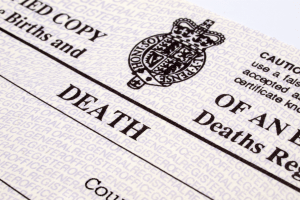Coroners are ‘insisting on processes that are at odds with the law’ and risking patients’ lives by stating deaths during the Covid-19 pandemic can only be verified in person by a trained GP or other healthcare professional, the BMA has warned.
London coroners have admitted there is ‘no legal requirement’ for a particular person to confirm someone has died, but they have stated it is their belief this should only be done by ‘a healthcare professional who has undertaken the appropriate training’.
The coroners issued a statement on the matter – understood to be sent across England and Wales – after they said LMCs had circulated information emphasising ‘absolutely anyone’ can verify a death.
In the statement, released earlier this month, the coroners also said they have concerns about NHS England guidance that seemed to suggest family members or funeral directors can verify deaths, with help from a GP over the phone or by video.
The London coroners said there were some scenarios where a patient could be incorrectly assessed as being dead if a trained healthcare professional is not physically present – for instance where patients are deeply unconscious, with very shallow irregular respirations.
But the BMA responded in a letter saying the coroners’ stance, which is ‘disappointing in the extreme’, could indirectly cause excess deaths because doctors would be unnecessarily pulled away from frontline care.
It said the London group’s view was different to coroners in many other regions where more appropriate arrangements had been set up.
The BMA wants to see coroners allow GPs to remotely verify death via video link, with the assistance of someone – such as a health or care worker – who is with the patient.
It has drawn up new joint guidance with the RCGP on the process of remote verification, which is endorsed by the CQC.
The BMA later clarified in a statement to Pulse that in practice it is already the case that verification is often carried out in this way.
Separately, in other regions, LMCs and coroners have been working together to develop their own protocols during the pandemic.
Leicester, Leicestershire and Rutland LMC has agreed a system of remote verification with its coroners, in which expected deaths can be verified by a GP or other trained healthcare professional, overseen by another person who is present with the deceased patient.
The LMC has drawn up a set of questions that the GP or trained healthcare professional will talk through with the person who is with the patient.
It stressed the protocol does not cover the new process for death certification – when a doctor decides the cause of death – or the ways in which a registrar registers the death, both of which have been altered by new regulations in England and Wales.
BMA GP committee deputy chair Dr Mark Sanford-Wood said in a statement: ‘GPs around the country have, on the whole, positive relationships with their local coroners, and both groups have for a long time worked together to ensure that processes are sensible, pragmatic and sensitive to the feelings of the bereaved.
‘However, we have recently become aware of some coroners insisting on processes that are at odds with the law.’
He added: ‘The law is clear that it does not require a GP to physically visit the deceased to verify death.
‘We are of course in unprecedented times, and to insist that a GP is taken away from the frontline care of sick patients puts the vital help that they are able to offer at risk. This is notwithstanding the personal risk that a doctor faces if visiting a patient who has died from Covid-19-related illness.
‘The BMA wants to reach a position whereby a GP can reach the person in attendance and – with their agreement – remotely, and preferably by video, allow verification by the GP to occur with their help.’
But the London coroners later said they stood by the views in their original statement.
The original statement said: ‘The senior coroners in London are in agreement that the verification of death should be undertaken by a healthcare professional who has undertaken the appropriate training.
‘In the majority of areas this is restricted to doctors, nurses and paramedics. There are specific, prescribed circumstances where police officers may verify life extinct. Police officers receive specific training in relation to this.’
The statement added: ‘We do not consider that it is an acceptable position for untrained funeral directors or family members to verify life extinct.
‘Diagnosis of death is a clinical one undertaken by a competent adult with the appropriate skills and training. It is, in our view, inappropriate for a person who is not suitably trained to recognise death. This would result in the body being moved from the place of death without any independent check of the body.’
NHS England declined to comment but confirmed its official guidance on death verfication will be issued shortly.
CQC chief inspector of primary care Dr Rosie Benneyworth said: ‘This is a trying time for everyone working in health and social care, with a great deal being asked of everyone with a role to play in caring for people during the pandemic.
‘The law in England allows for any “competent person” to verify death if they feel confident to do so but it may not be something that a non-clinician has done in the past and can be emotionally testing as well as unfamiliar.
‘This guidance from the British Medical Association (BMA) and Royal College of General Practitioners (RCGP) should provide welcome support to non-clinicians who feel able to take on this sensitive and important task.’
Pulse October survey
Take our July 2025 survey to potentially win £1.000 worth of tokens














“We do not consider that it is an acceptable position for untrained funeral directors or family members to verify life extinct.”
It raises the obvious question:
Why not train funeral directors to verify death?